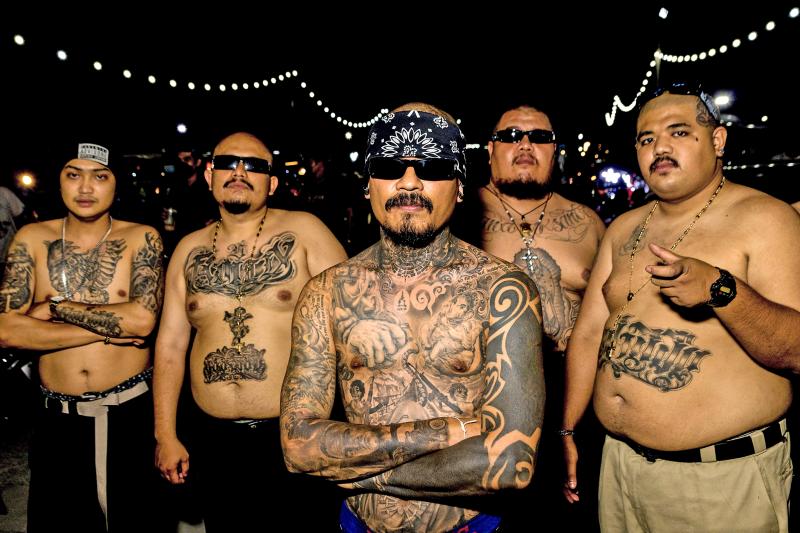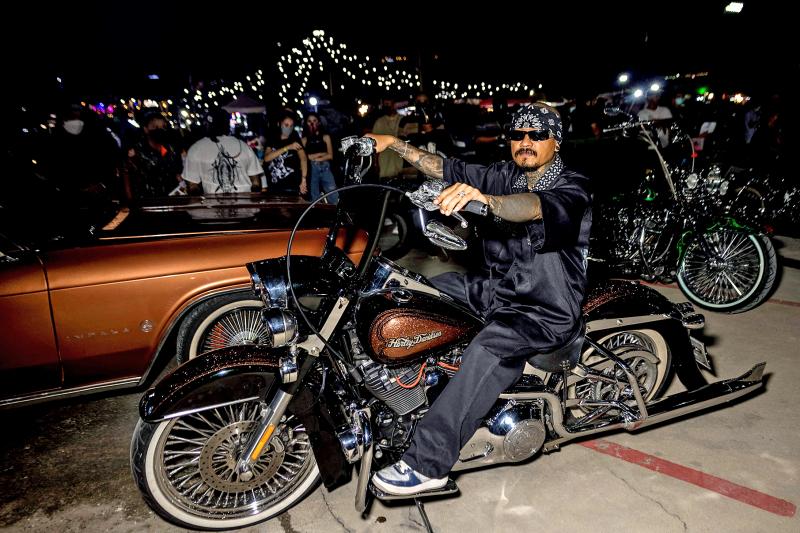The crowd roars in the tightly packed room as the broad-shouldered, tattooed men stop pummeling a young recruit and smother him with hugs — completing his initiation into one of Thailand’s “Chicano” gangs.
For the tight-knit group of friends, the ritual embodies a concept of a Mexican-American Chicano culture increasingly embraced in Asia, with sounds, styles and swagger from the US finding a home first in Japan, and now Thailand.
Dressed in baggy T-shirts and jeans, with bandanas and wraparound sunglasses only partially obscuring their intricate tattoos, Thais can now be seen on Bangkok’s sweaty streets celebrating a fusion of their own and Chicano culture each weekend.

Photo: AFP
But while the Chicano movement in the US began as a political and social force aimed at battling oppression, its Thai interpretation is focused more on its aesthetics.
“I just want to combine a Thai touch with the Chicano style to make this lifestyle simple and accessible,” explained gang leader Chalakorn “Leng” Arttanasiri, dismounting from his Harley Davidson.
Dragging on a smoke, the 40-year-old — who has images of the Virgin Mary, a Mayan goddess and much of “The Godfather” cast tattooed across his body — said his “Barbarian Has a Gun 13” group celebrates Chicano clothing and tattoos.

Photo: AFP
Its members say they are drawing on shared blue-collar values to create a blended “Thaino” culture, leaving their Chicano selves behind during the working week.
“On normal days, we dress like normal people,” Leng said, “but on the day of the gathering like this, we need to have options for our clothing so that we could look sharp and rock the same style as the others.”
A former drug-dealer, he grew up in a slum and served time but turned his life around running a business importing Chicano clothes, which prompted him to create a group to celebrate the culture.
But he has no time for the violence often associated with Chicanos by Hollywood — despite the tough initiation.
“It’s just a way to test their will,” he explained of the 13-second ordeal recruits endure to join his group.
“We can’t go around beating up other gangs to show our superiority,” he said. “We live in peace because we’re in a Buddhist-based city. We’re in Thailand.”
‘LAW-ABIDING CITIZENS’
“We’re law-abiding citizens who just love the Chicano subculture,” said Pongtep Singto, a lowrider car aficionado.
The 32-year-old was drawn to the scene’s low-slung, streamlined cars, collecting and customising the vehicles, and eventually building his own.
“Everybody has an honest career. Some of them may have tattoos all over their bodies but they’re all good people,” he added.
At a recent gathering, heavily tattooed men happily chatted as their children played in the background.
Among them was new recruit Chaiya Nob, who explained how gang “seniors” — only 13 of whom are permitted to have the group’s name dramatically emblazoned across their bellies — assessed him before he was allowed to join.
“Dressing like this doesn’t mean we have to act all macho, act like gangsters, and do illegal stuff,” the 31-year-old said.
“We have to do good and be respectable citizens. Our clothing choices may not be appropriate but our attitude is approachable,” he added with a grin.
Ultimately, the gang is about celebrating Chicano subculture together. As Leng puts it: “We’re family.”

Jacques Poissant’s suffering stopped the day he asked his daughter if it would be “cowardly to ask to be helped to die.” The retired Canadian insurance adviser was 93, and “was wasting away” after a long battle with prostate cancer. “He no longer had any zest for life,” Josee Poissant said. Last year her mother made the same choice at 96 when she realized she would not be getting out of hospital. She died surrounded by her children and their partners listening to the music she loved. “She was at peace. She sang until she went to sleep.” Josee Poissant remembers it as a beautiful

For many centuries from the medieval to the early modern era, the island port of Hirado on the northwestern tip of Kyushu in Japan was the epicenter of piracy in East Asia. From bases in Hirado the notorious wokou (倭寇) terrorized Korea and China. They raided coastal towns, carrying off people into slavery and looting everything from grain to porcelain to bells in Buddhist temples. Kyushu itself operated a thriving trade with China in sulfur, a necessary ingredient of the gunpowder that powered militaries from Europe to Japan. Over time Hirado developed into a full service stop for pirates. Booty could

Before the last section of the round-the-island railway was electrified, one old blue train still chugged back and forth between Pingtung County’s Fangliao (枋寮) and Taitung (台東) stations once a day. It was so slow, was so hot (it had no air conditioning) and covered such a short distance, that the low fare still failed to attract many riders. This relic of the past was finally retired when the South Link Line was fully electrified on Dec. 23, 2020. A wave of nostalgia surrounded the termination of the Ordinary Train service, as these train carriages had been in use for decades

Lori Sepich smoked for years and sometimes skipped taking her blood pressure medicine. But she never thought she’d have a heart attack. The possibility “just wasn’t registering with me,” said the 64-year-old from Memphis, Tennessee, who suffered two of them 13 years apart. She’s far from alone. More than 60 million women in the US live with cardiovascular disease, which includes heart disease as well as stroke, heart failure and atrial fibrillation. And despite the myth that heart attacks mostly strike men, women are vulnerable too. Overall in the US, 1 in 5 women dies of cardiovascular disease each year, 37,000 of them